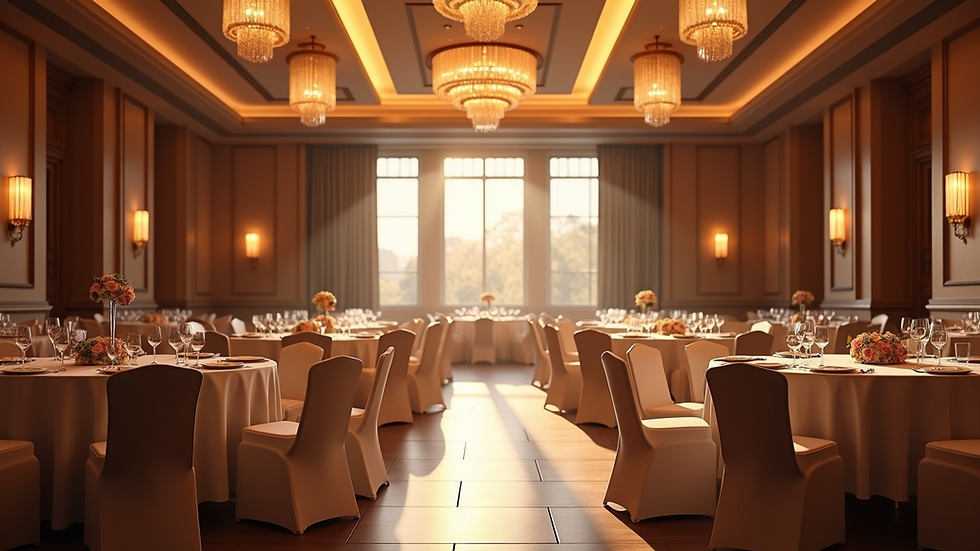- thewoodsvenues
- Sep 29, 2025
- 3 min read
When planning an event, one of the most important steps is touring the location where it will take place. A thorough visit helps you visualize the space, understand its capabilities, and avoid surprises on the big day. Whether you are organizing a wedding, corporate gathering, or social celebration, knowing what to look for during an event venue tour can save you time, money, and stress.
Why Event Venue Tours Are Essential
Event venue tours provide a firsthand experience of the space. Photos and descriptions online can only tell you so much. Walking through the site allows you to:
Assess the layout: See how the rooms flow and where guests will gather.
Check accessibility: Ensure entrances, restrooms, and parking meet your needs.
Visualize decor and setup: Imagine how your theme and furniture will fit.
Meet the staff: Gauge their professionalism and willingness to assist.
Identify potential challenges: Look for issues like poor lighting or limited electrical outlets.
For example, if you plan a seated dinner, you want to confirm the dining area can comfortably accommodate your guest list. If you are hosting a conference, check for AV equipment and Wi-Fi availability. These details become clear only when you tour the space in person.

What to Look for During Event Venue Tours
When you visit a venue, keep a checklist handy to cover all important aspects. Here are some key points to focus on:
Space and Capacity
Confirm the maximum number of guests allowed.
Check if there are separate rooms for different activities.
Look for outdoor areas if you want an open-air option.
Amenities and Facilities
Restrooms: Are they clean and sufficient for your crowd?
Kitchen: Is there a catering prep area or restrictions on food service?
Parking: Is there ample parking or nearby public transit?
Technical Features
Lighting: Can it be adjusted for mood or presentations?
Sound system: Is there built-in audio equipment or will you need to rent?
Power outlets: Are there enough for your devices and equipment?
Ambiance and Style
Décor: Does the style match your event’s theme or will you need extensive decoration?
Acoustics: Is the space noisy or quiet enough for speeches and music?
Temperature control: Is heating or air conditioning available and effective?
Policies and Restrictions
Noise limits and curfews.
Alcohol and smoking rules.
Setup and cleanup responsibilities.
Taking notes and photos during the tour helps you compare options later and make an informed decision.

What's Another Word for Venue?
Sometimes, you might want to use different terms to describe the place where your event will happen. Here are some alternatives to the word "venue":
Location: A general term for the place of an event.
Site: Often used for outdoor or large-scale events.
Facility: Emphasizes the amenities and infrastructure.
Hall: Common for indoor spaces like banquet or conference halls.
Place: Informal and broad.
Setting: Highlights the atmosphere or environment.
Spot: Casual and conversational.
Using varied vocabulary can make your event descriptions more engaging and tailored to your audience.
Tips for Making the Most of Your Venue Tour
To get the best results from your visit, consider these practical tips:
Schedule a tour during the time your event will take place. This helps you see lighting and noise conditions realistically.
Bring your event planner or key team members. Different perspectives can catch details you might miss.
Ask plenty of questions. Don’t hesitate to inquire about anything from setup times to emergency exits.
Request a floor plan. This aids in planning seating arrangements and traffic flow.
Test technology. If possible, try out microphones, projectors, or Wi-Fi.
Consider logistics. Think about how vendors will load in and out, and where guests will enter.
Take measurements. If you have specific furniture or equipment, verify it fits comfortably.
By preparing ahead, you can avoid last-minute surprises and ensure the space meets your event’s needs.

Planning Your Event with Confidence
Touring a venue is a critical step that sets the foundation for a successful event. It allows you to confirm that the space aligns with your vision and logistical requirements. With careful observation and thoughtful questions, you can select a location that enhances your event experience.
Remember, the right space not only accommodates your guests but also supports your event’s purpose and style. Taking the time to tour and evaluate options will give you peace of mind and help you create memorable moments for everyone involved.





Comments